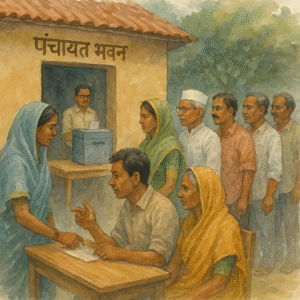The Patna High Court, in an oral judgment dated 20 December 2024, set aside the employer’s decision to reduce the pension and recover ₹2,13,908 from the gratuity of a retired Central Industrial Security Force (CISF) Sub-Inspector (a Class-III, non-gazetted employee). The Court held that recovery from Class-III and Class-IV employees for alleged excess pay—especially after retirement, and absent any fraud or misrepresentation—runs contrary to settled Supreme Court law. The writ petition was accordingly allowed, and the authorities were directed to restore pensionary benefits based on the pay to which the employee was entitled on the date of retirement and to release terminal benefits forthwith.
The dispute arose when, after the petitioner’s superannuation on 31 July 2023, the department communicated objections raised by the Regional Pay & Accounts Office regarding an earlier pay fixation dating back to 04 November 2008. Without issuing a show-cause notice or affording a hearing, the department reduced pay and deducted ₹2,13,908 from gratuity by a letter dated 30 November 2023, followed by consequential communications in October, December 2023 and March 2024. The petitioner challenged these actions as arbitrary, violative of natural justice, and contrary to Supreme Court guidelines that shield certain categories of employees from recovery of excess payments.
On facts, the petitioner was appointed as ASI (Executive/Radio) on 29 May 2004, promoted to SI on 04 November 2008, and later given notional promotion with pay equal to a junior from 02 May 2008. After retirement, he sought release of pensionary dues, only to be told that his 2008 pay fixation was “incorrect,” prompting the impugned recovery from gratuity.
The petitioner relied primarily on State of Punjab v. Rafiq Masih (White Washer) (2015) 4 SCC 334, wherein the Supreme Court summarized situations where recovery is impermissible, including (i) recoveries from Class-III and Class-IV employees; (ii) recoveries from retired employees or those due to retire within a year; and (iii) recoveries relating to payments made more than five years prior to the recovery order, among others.
The respondents, however, argued that the petitioner had executed an undertaking in February 2023 permitting adjustment of outstanding government dues from salary or retirement benefits. They invoked the Supreme Court ruling in High Court of Punjab & Haryana v. Jagdev Singh, (2016) 14 SCC 267, to submit that where an employee furnishes an undertaking accepting recovery of any excess payment, the employer is entitled to effect such recovery.
After examining the rival submissions and the governing precedents, the Patna High Court distinguished Jagdev Singh on a material ground: that case concerned a judicial officer (a Class-II/Superior Judicial Service post), whereas the present petitioner is a Class-III, non-gazetted employee. The ratio in Rafiq Masih explicitly protects Class-III and Class-IV employees from recovery in such circumstances, and the Court held that an undertaking obtained in standard “option forms” cannot be used to override those protections for Class-III employees, especially after retirement.
The Court’s reasoning is anchored in a line of Supreme Court decisions that consistently restrain recovery of excess payments where the employee neither misrepresented facts nor committed fraud, and the overpayment resulted from the employer’s error or a mistaken interpretation of rules. It cited Sahib Ram v. State of Haryana, 1995 Supp (1) SCC 18; Col. B.J. Akkara (Retd.) v. Union of India, (2006) 11 SCC 709; and Syed Abdul Qadir v. State of Bihar, (2009) 3 SCC 475 to underscore that, particularly for retired employees, recovery is inequitable and causes undue hardship.
In the result, the Patna High Court quashed the letters/orders dated 12 October 2023, 30 November 2023, 08 December 2023, and 18 March 2024 and directed immediate restoration of the petitioner’s pension to the rightful level, along with payment of terminal benefits. No order as to costs was made.
Significance or Implication of the Judgment
This decision is an important affirmation of employee-friendly jurisprudence on recoveries from Class-III/Class-IV government staff and equivalent non-gazetted personnel. It reiterates that standard undertakings in pay-revision option forms cannot be stretched to permit recovery from retired Class-III employees where the alleged overpayment traces back to administrative error rather than employee misconduct. The Court’s approach aligns with Rafiq Masih, making clear that the humane, equitable principle against harsh recoveries continues to apply despite departmental reliance on undertakings. For government departments and PSUs, the judgment is a reminder to build robust pre-retirement verification mechanisms for pay fixation and to issue show-cause notices and provide hearings before any adverse action—especially when touching protected categories of employees. For retirees, it provides reassurance that pension and gratuity—lifelines after superannuation—cannot be casually diminished for historical fixation issues absent fraud, misrepresentation, or other disqualifying factors recognized by the Supreme Court.
Legal Issue(s) Decided and the Court’s Decision with reasoning
- Whether a Class-III, non-gazetted employee can be subjected to post-retirement recovery of alleged excess pay based on an undertaking executed in the option form.
Held: No. The High Court distinguished Jagdev Singh (which concerned a higher-rank judicial officer) and applied Rafiq Masih’s protective categories, holding that recovery from Class-III/Class-IV employees is impermissible in law where overpayment stems from the department’s mistake and there is no misrepresentation. - Whether recovery from gratuity and reduction of pension, without show-cause or opportunity of hearing, is sustainable.
Held: No. The Court found the unilateral reduction and recovery arbitrary and set aside the impugned communications, directing restoration of pensionary benefits and immediate release of dues. - Whether Supreme Court precedents restraining recovery in cases of administrative error and absence of employee fault continue to control.
Held: Yes. The Court reaffirmed Sahib Ram, Col. B.J. Akkara, Syed Abdul Qadir, and Rafiq Masih to bar such recoveries, particularly post-retirement.
Judgments Referred by Parties
- State of Punjab & Ors. v. Rafiq Masih (White Washer) & Ors., (2015) 4 SCC 334. (Relied on by the petitioner to argue impermissibility of recovery from Class-III/IV and retired employees.)
- High Court of Punjab and Haryana v. Jagdev Singh, (2016) 14 SCC 267. (Relied on by respondents to justify recovery on the basis of an undertaking.)
Judgments Relied Upon or Cited by Court
- State of Punjab & Ors. v. Rafiq Masih (White Washer) & Ors., (2015) 4 SCC 334. (Guidelines on impermissible recoveries, para 18.)
- Sahib Ram v. State of Haryana & Ors., 1995 Supp (1) SCC 18.
- Col. B.J. Akkara (Retd.) v. Government of India & Ors., (2006) 11 SCC 709.
- Syed Abdul Qadir & Ors. v. State of Bihar & Ors., (2009) 3 SCC 475.
- High Court of Punjab and Haryana v. Jagdev Singh, (2016) 14 SCC 267 (distinguished on facts/class of post).
Case Title
Pramod Kumar Sinha vs. Union of India & Ors.
Case Number
Civil Writ Jurisdiction Case No. 11407 of 2024.
Citation(s)
2025 (1) PLJR 553
Coram and Names of Judges
Hon’ble Mr. Justice Purnendu Singh.
Names of Advocates and who they appeared for
For the petitioner: Mr. Gajendra Pratap Singh, Advocate.
For the respondents: Mr. (Dr.) Krishna Nandan Singh, ASGI; Mrs. Punam Kumari Singh, CGC; Mr. Amarjeet, JC to ASGI.
Link to Judgment
MTUjMTE0MDcjMjAyNCMxI04=-OtEdoy0Otdw=
If you found this explanation helpful and wish to stay informed about how legal developments may affect your rights in Bihar, you may consider following Samvida Law Associates for more updates.








